中考英语复习状语从句课件(共29张PPT)
文档属性
| 名称 | 中考英语复习状语从句课件(共29张PPT) |

|
|
| 格式 | zip | ||
| 文件大小 | 339.0KB | ||
| 资源类型 | 教案 | ||
| 版本资源 | 人教新目标(Go for it)版 | ||
| 科目 | 英语 | ||
| 更新时间 | 2023-02-03 20:50:38 | ||
图片预览

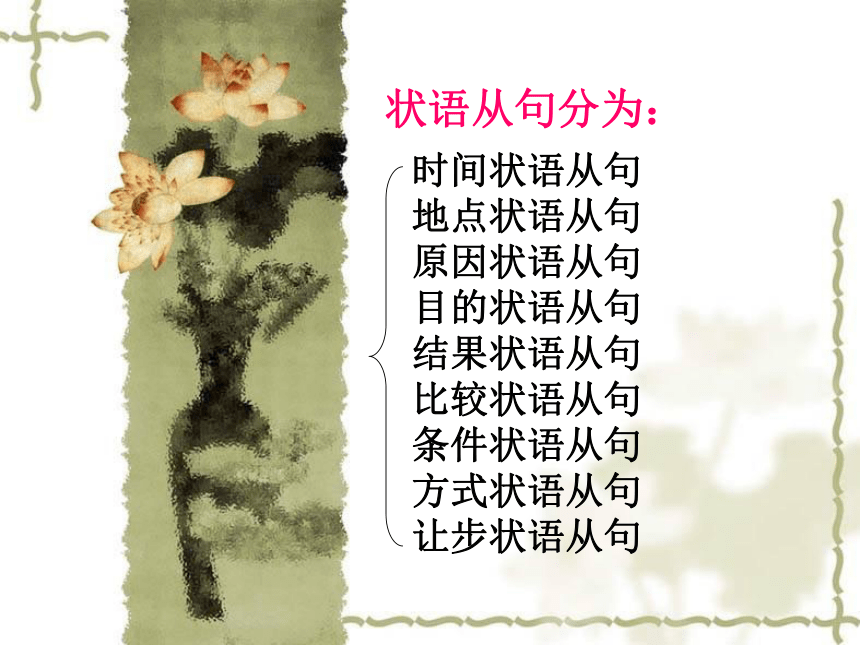
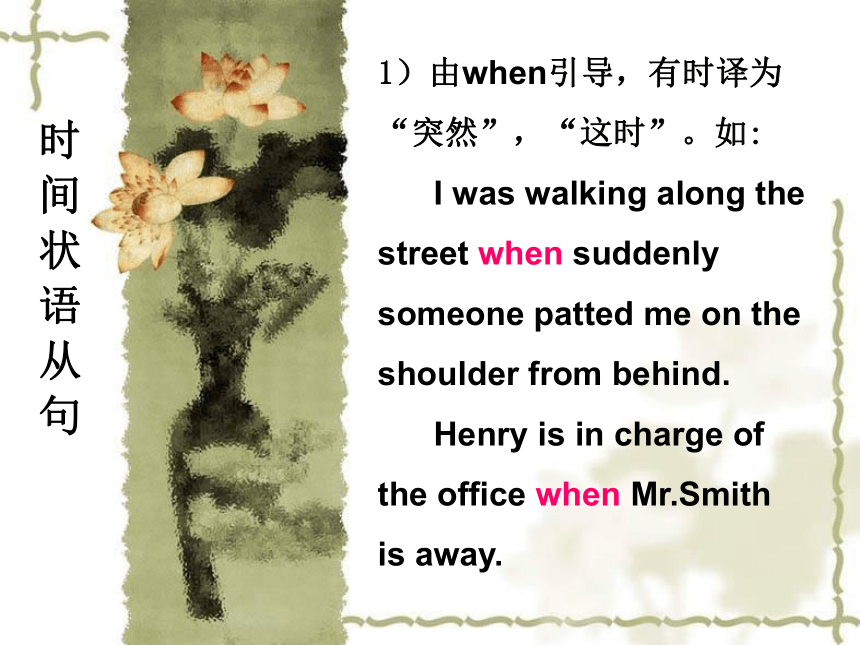
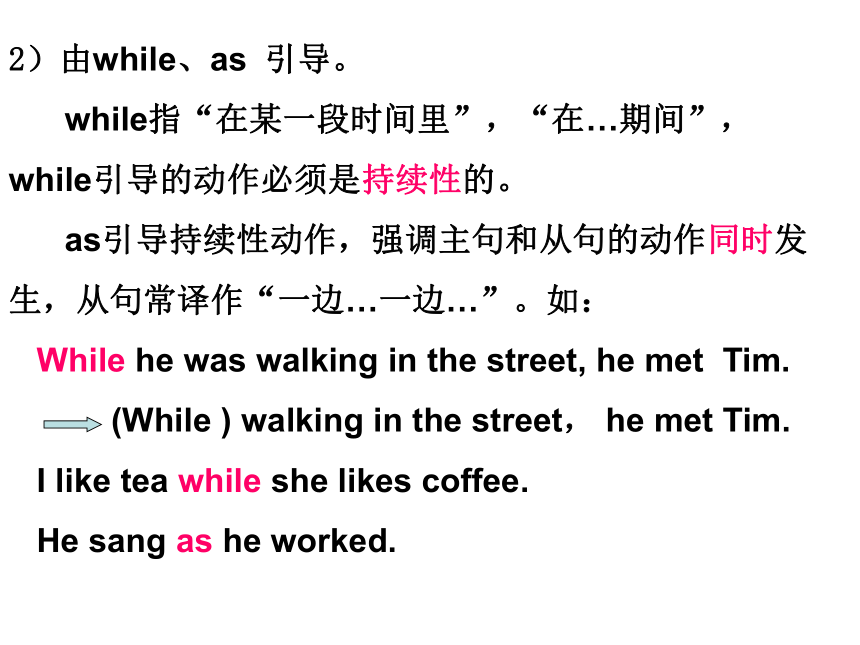
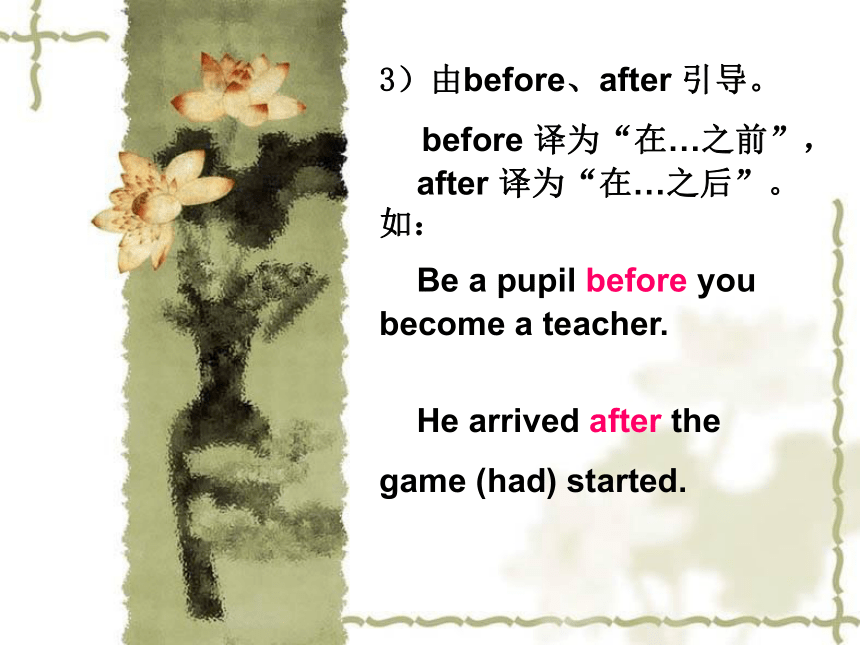
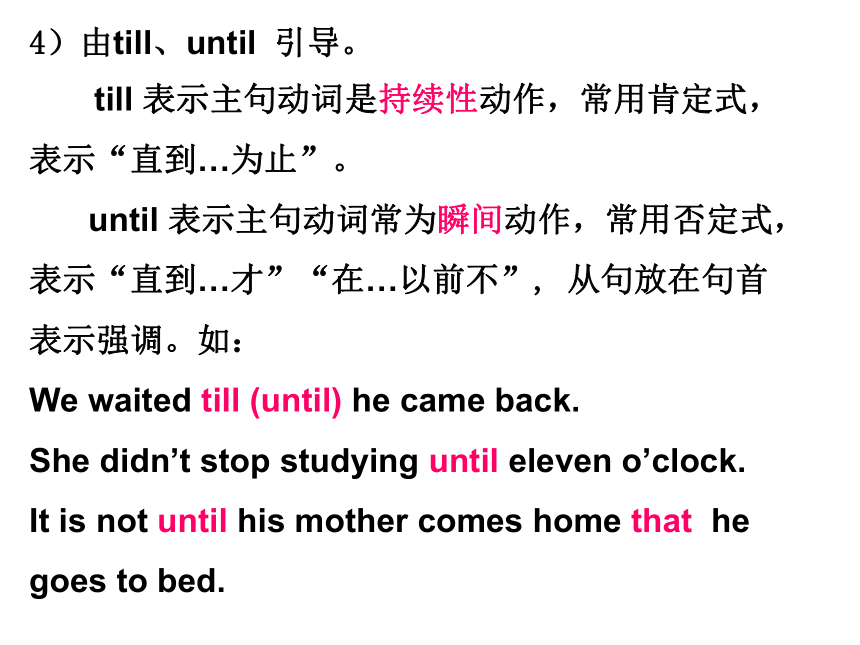
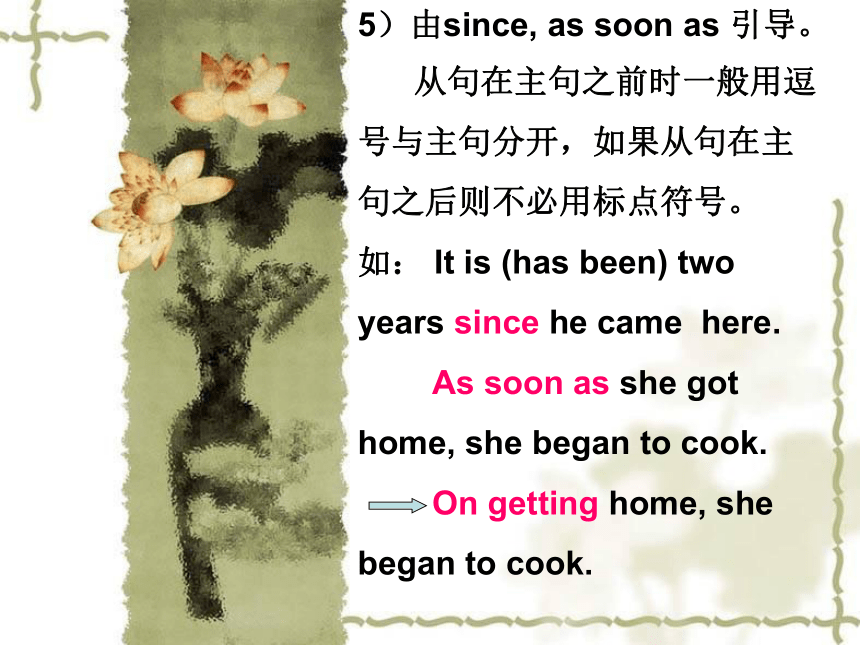
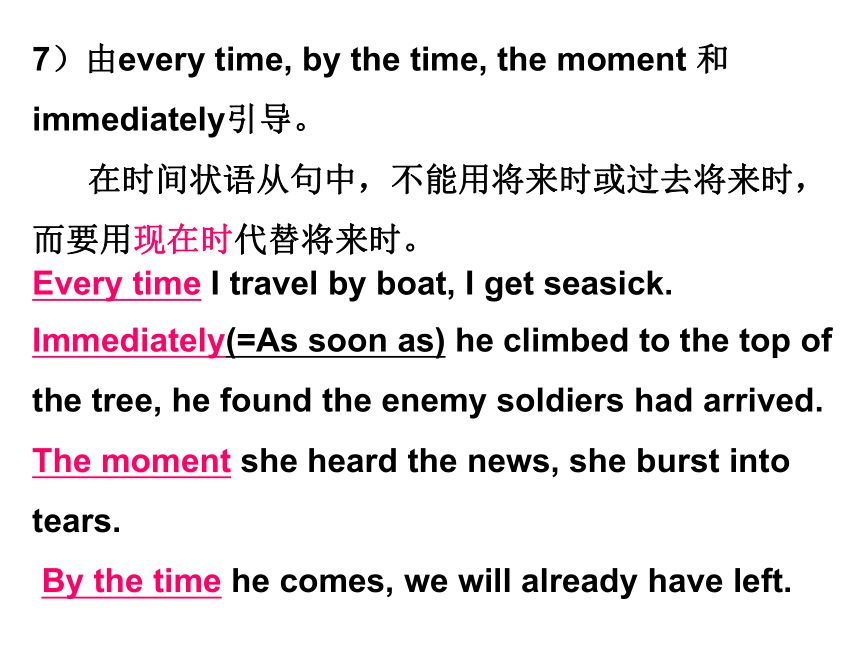

文档简介
(共29张PPT)
时间状语从句
地点状语从句
原因状语从句
目的状语从句
结果状语从句
比较状语从句
条件状语从句
方式状语从句
让步状语从句
状语从句分为:
1)由when引导,有时译为“突然”,“这时”。如:
I was walking along the street when suddenly someone patted me on the shoulder from behind.
Henry is in charge of the office when Mr.Smith is away.
时 间 状 语 从 句
2)由while、as 引导。
while指“在某一段时间里”,“在…期间”,while引导的动作必须是持续性的。
as引导持续性动作,强调主句和从句的动作同时发生,从句常译作“一边…一边…”。如:
While he was walking in the street, he met Tim.
(While ) walking in the street, he met Tim.
I like tea while she likes coffee.
He sang as he worked.
3)由before、after 引导。
before 译为“在…之前”,
after 译为“在…之后”。
如:
Be a pupil before you
become a teacher.
He arrived after the game (had) started.
4)由till、until 引导。
till 表示主句动词是持续性动作,常用肯定式,表示“直到…为止”。
until 表示主句动词常为瞬间动作,常用否定式,表示“直到…才”“在…以前不”, 从句放在句首表示强调。如:
We waited till (until) he came back.
She didn’t stop studying until eleven o’clock.
It is not until his mother comes home that he goes to bed.
5)由since, as soon as 引导。
从句在主句之前时一般用逗号与主句分开,如果从句在主句之后则不必用标点符号。
如: It is (has been) two years since he came here.
As soon as she got home, she began to cook.
On getting home, she began to cook.
7)由every time, by the time, the moment 和immediately引导。
在时间状语从句中,不能用将来时或过去将来时,而要用现在时代替将来时。
Every time I travel by boat, I get seasick.
Immediately(=As soon as) he climbed to the top of the tree, he found the enemy soldiers had arrived.
The moment she heard the news, she burst into tears.
By the time he comes, we will already have left.
Exercises:
1.They walked out of the room _________the
meeting was over.
2. ____________ he arrived, the train had already gone.
3.Take the medicine _______you go to bed.
as soon as
By the time
before
4.I knew nothing about it _______he told me.
5.It is more than five years _____we started to
learn English.
6._____ he talked on, he got more and more
excited.
7.We should strike _______the iron is hot.
until
since
As
while
由where,wherever引导:
where与wherever意义基本相同,但后者语气较强,多用于书面语。
如:
Where there is a will, there is a way.
You are free to go wherever you like.
地 点 状 语 从 句
1)由because引导。
because用来回答why 的问题,语气最强,一般放在主句之后。如:He didn’t go to school because he was ill.
He was ill , so he didn’t go to school.
Being ill, he didn’t go to school.
原 因 状 语 从 句
2)由since,as, for引导。
since常译成 “既然”,表示已知的理由或稍加分析即可得出的原因, 多放句首。as表示显而易见的原因多译成 “由于或因为”。而for的语气最弱,为附加的原因。如:
Since everyone is here, let’s begin our meeting.
As Jane was the oldest child in her family, she had to look after her younger brothers and sisters.
He must be ill, for he was absent today.
Exercises:
1.The teacher must be strict with you ____
they want you to make great progress.
2. ____ your father is well again, you no longer have anything to worry about.
3.The day breaks, _____ the birds are singing.
as
Since
for
目 的 状 语 从 句
由so that, in order that引导。目的状语从句中常用情态动词may (might), can (could), should 等放在动词之前,从句往往放在主句之后, 主从句之间不用任何标点符号。如:
They set out early so that (in order that) they
might arrive there in time.
They set out early in order to( so as to)
arrive there in time.
1). 由so that,so…that引导。so that前有逗号为结果状语从句,如:
We turned up the radio,
so that everyone heard
the news.
结 果 状 语 从 句
2)由such…that引导, such后面跟名词, 如果名词是单数, 就要用such a /an…that, 还可以换用so…that,语
气较强。如:
It was such bad weather that they decided to stay at home.
It is such an interesting novel that all of us want to read it.
It is so interesting a novel that all of us want to read it.
条 件 状 语 从 句
1). if
If you work harder, you will succeed.
Work harder, or you won’t succeed.
Working harder, you will succeed.
2). unless = if not
We can’t write to Mary unless she tells
us her address.
We can’t write to Mary if she doesn’t tell us
her address.
3). as long as
There is life as long as there is water and air.
You may borrow the book as long as you keep it clean.
方式状语从句
由as,as if,as though引导。as常译为“按照”或“正如”,as if或as though的意义和用法基本一样,常译为“好像,仿佛”。从句中可以用现在时表示可能符合事实,也可以用虚拟语气。
如 Draw a cat as I taught you .
Let’s do as Mrs. Li teaches us.
He talks as if he knew everything.
He behaved as if nothing had happened.
It sounds as though you have a good job.
1)由though,although引导。
though / although意义相同,
用法基本一样,前者通俗,口
语化,后者正式,多放主句的
前面。
如:
Although (Though) he was
over sixty, (yet) he began to
learn French.
让 步 状 语 从 句
2)由even if,even though引导。even if 和even though的意思为“即使”“纵使”有退一步设想的意味, 多用于书面语中。
如:
I’ll go even if (though) it rains tomorrow.
3)由as引导的状语从句多
用于书面语,它比用though
或although引导的从句语气
强,更有表现力, 从句常放在
句首,语序部分倒装。
如:
Young as he is , he knows a lot.
Although/Though he is young , he knows a lot.
4)由wh-ever引导
wh-ever从句中的动词有时可以和may连用。
wh-ever引导的是状语从句还是名词性从句区别
是:去掉该从句如果句子仍然完整, 则该从句是状
语从句;如果句子不完整了,则该从句是名词性从句
Whatever happens / may happen , we shall not lose heart.
Whoever is going to be the leader of our team doesn’t matter.
Whatever you do is none of my business.
Whatever you do, I don't care.
比较状语从句
1)由as…as,not so/as…as,the same…as,such…as引导。同级比较肯定句用as…as,否定句可用not as…as 或not so…as.
Mary is as old as my sister.
She is the same old as my sister.
Jack is not so hardworking as his elder brother.
2)由than引导
表示不同程度之比较, 如:
He bought fewer books than I (did).
3)由the more…the more引导,意为“越…越…”,通常的语序为从句在前,主句在后。如:
The more you read,
the better you understand.
1. Allow children the space to voice their opinions, _________ they are different from your own.
A. until B. even if
C. unless D. as though
2. He found it increasingly difficult to read, ______ his eyesight was beginning to fail.
A. and B. for
C. but D. or
3. He was about halfway through his meal ________ a familiar voice came to his ears.
A. why B. where
C. when D. while
B
B
C
(where, unless, if, as, such…that, even though , as if)
1.A driver should slow down ______ the roads are narrow.
2.___________ you mail the letter now, it won’t arrive there today.
3.___he has time, he will come and see us later.
4.Tom made ____ great progress ____ his headmaster praised him at the school meeting.
5.____ his father knew what he had done, the boy was going to be in trouble.
6.We will stay a little longer _____ it is very late.
where
Even though
If
such
that
As
unless
7.She pretended to laugh loudly __________ the story were very funny.
8.Poor ___ his English was, yet Mr.Li made himself understood in England.
9.You should do ___your parents ask you to do.
as though
as
as
时间状语从句
地点状语从句
原因状语从句
目的状语从句
结果状语从句
比较状语从句
条件状语从句
方式状语从句
让步状语从句
状语从句分为:
1)由when引导,有时译为“突然”,“这时”。如:
I was walking along the street when suddenly someone patted me on the shoulder from behind.
Henry is in charge of the office when Mr.Smith is away.
时 间 状 语 从 句
2)由while、as 引导。
while指“在某一段时间里”,“在…期间”,while引导的动作必须是持续性的。
as引导持续性动作,强调主句和从句的动作同时发生,从句常译作“一边…一边…”。如:
While he was walking in the street, he met Tim.
(While ) walking in the street, he met Tim.
I like tea while she likes coffee.
He sang as he worked.
3)由before、after 引导。
before 译为“在…之前”,
after 译为“在…之后”。
如:
Be a pupil before you
become a teacher.
He arrived after the game (had) started.
4)由till、until 引导。
till 表示主句动词是持续性动作,常用肯定式,表示“直到…为止”。
until 表示主句动词常为瞬间动作,常用否定式,表示“直到…才”“在…以前不”, 从句放在句首表示强调。如:
We waited till (until) he came back.
She didn’t stop studying until eleven o’clock.
It is not until his mother comes home that he goes to bed.
5)由since, as soon as 引导。
从句在主句之前时一般用逗号与主句分开,如果从句在主句之后则不必用标点符号。
如: It is (has been) two years since he came here.
As soon as she got home, she began to cook.
On getting home, she began to cook.
7)由every time, by the time, the moment 和immediately引导。
在时间状语从句中,不能用将来时或过去将来时,而要用现在时代替将来时。
Every time I travel by boat, I get seasick.
Immediately(=As soon as) he climbed to the top of the tree, he found the enemy soldiers had arrived.
The moment she heard the news, she burst into tears.
By the time he comes, we will already have left.
Exercises:
1.They walked out of the room _________the
meeting was over.
2. ____________ he arrived, the train had already gone.
3.Take the medicine _______you go to bed.
as soon as
By the time
before
4.I knew nothing about it _______he told me.
5.It is more than five years _____we started to
learn English.
6._____ he talked on, he got more and more
excited.
7.We should strike _______the iron is hot.
until
since
As
while
由where,wherever引导:
where与wherever意义基本相同,但后者语气较强,多用于书面语。
如:
Where there is a will, there is a way.
You are free to go wherever you like.
地 点 状 语 从 句
1)由because引导。
because用来回答why 的问题,语气最强,一般放在主句之后。如:He didn’t go to school because he was ill.
He was ill , so he didn’t go to school.
Being ill, he didn’t go to school.
原 因 状 语 从 句
2)由since,as, for引导。
since常译成 “既然”,表示已知的理由或稍加分析即可得出的原因, 多放句首。as表示显而易见的原因多译成 “由于或因为”。而for的语气最弱,为附加的原因。如:
Since everyone is here, let’s begin our meeting.
As Jane was the oldest child in her family, she had to look after her younger brothers and sisters.
He must be ill, for he was absent today.
Exercises:
1.The teacher must be strict with you ____
they want you to make great progress.
2. ____ your father is well again, you no longer have anything to worry about.
3.The day breaks, _____ the birds are singing.
as
Since
for
目 的 状 语 从 句
由so that, in order that引导。目的状语从句中常用情态动词may (might), can (could), should 等放在动词之前,从句往往放在主句之后, 主从句之间不用任何标点符号。如:
They set out early so that (in order that) they
might arrive there in time.
They set out early in order to( so as to)
arrive there in time.
1). 由so that,so…that引导。so that前有逗号为结果状语从句,如:
We turned up the radio,
so that everyone heard
the news.
结 果 状 语 从 句
2)由such…that引导, such后面跟名词, 如果名词是单数, 就要用such a /an…that, 还可以换用so…that,语
气较强。如:
It was such bad weather that they decided to stay at home.
It is such an interesting novel that all of us want to read it.
It is so interesting a novel that all of us want to read it.
条 件 状 语 从 句
1). if
If you work harder, you will succeed.
Work harder, or you won’t succeed.
Working harder, you will succeed.
2). unless = if not
We can’t write to Mary unless she tells
us her address.
We can’t write to Mary if she doesn’t tell us
her address.
3). as long as
There is life as long as there is water and air.
You may borrow the book as long as you keep it clean.
方式状语从句
由as,as if,as though引导。as常译为“按照”或“正如”,as if或as though的意义和用法基本一样,常译为“好像,仿佛”。从句中可以用现在时表示可能符合事实,也可以用虚拟语气。
如 Draw a cat as I taught you .
Let’s do as Mrs. Li teaches us.
He talks as if he knew everything.
He behaved as if nothing had happened.
It sounds as though you have a good job.
1)由though,although引导。
though / although意义相同,
用法基本一样,前者通俗,口
语化,后者正式,多放主句的
前面。
如:
Although (Though) he was
over sixty, (yet) he began to
learn French.
让 步 状 语 从 句
2)由even if,even though引导。even if 和even though的意思为“即使”“纵使”有退一步设想的意味, 多用于书面语中。
如:
I’ll go even if (though) it rains tomorrow.
3)由as引导的状语从句多
用于书面语,它比用though
或although引导的从句语气
强,更有表现力, 从句常放在
句首,语序部分倒装。
如:
Young as he is , he knows a lot.
Although/Though he is young , he knows a lot.
4)由wh-ever引导
wh-ever从句中的动词有时可以和may连用。
wh-ever引导的是状语从句还是名词性从句区别
是:去掉该从句如果句子仍然完整, 则该从句是状
语从句;如果句子不完整了,则该从句是名词性从句
Whatever happens / may happen , we shall not lose heart.
Whoever is going to be the leader of our team doesn’t matter.
Whatever you do is none of my business.
Whatever you do, I don't care.
比较状语从句
1)由as…as,not so/as…as,the same…as,such…as引导。同级比较肯定句用as…as,否定句可用not as…as 或not so…as.
Mary is as old as my sister.
She is the same old as my sister.
Jack is not so hardworking as his elder brother.
2)由than引导
表示不同程度之比较, 如:
He bought fewer books than I (did).
3)由the more…the more引导,意为“越…越…”,通常的语序为从句在前,主句在后。如:
The more you read,
the better you understand.
1. Allow children the space to voice their opinions, _________ they are different from your own.
A. until B. even if
C. unless D. as though
2. He found it increasingly difficult to read, ______ his eyesight was beginning to fail.
A. and B. for
C. but D. or
3. He was about halfway through his meal ________ a familiar voice came to his ears.
A. why B. where
C. when D. while
B
B
C
(where, unless, if, as, such…that, even though , as if)
1.A driver should slow down ______ the roads are narrow.
2.___________ you mail the letter now, it won’t arrive there today.
3.___he has time, he will come and see us later.
4.Tom made ____ great progress ____ his headmaster praised him at the school meeting.
5.____ his father knew what he had done, the boy was going to be in trouble.
6.We will stay a little longer _____ it is very late.
where
Even though
If
such
that
As
unless
7.She pretended to laugh loudly __________ the story were very funny.
8.Poor ___ his English was, yet Mr.Li made himself understood in England.
9.You should do ___your parents ask you to do.
as though
as
as
同课章节目录
- 词法
- 名词
- 动词和动词短语
- 动词语态
- 动词时态
- 助动词和情态动词
- 非谓语动词
- 冠词
- 代词
- 数词和量词
- 形容词副词及其比较等级
- 介词和介词短语
- 连词和感叹词
- 构词法
- 相似、相近词比较
- 句法
- 陈述句
- 一般疑问句和否定疑问句
- 特殊疑问句及选择疑问句
- 反意疑问句
- 存在句(There be句型)
- 宾语从句
- 定语从句
- 状语从句
- 主谓一致问题
- 简单句
- 并列句
- 复合句
- 主谓一致
- 主、表语从句
- 名词性从句
- 直接引语和间接引语
- 虚拟语气
- 感叹句
- 强调句
- 倒装句
- 祈使句
- 句子的成分
- 句子的分类
- 题型专区
- 单项选择部分
- 易错题
- 完形填空
- 阅读理解
- 词汇练习
- 听说训练
- 句型转换
- 补全对话
- 短文改错
- 翻译
- 书面表达
- 任务型阅读
- 语法填空
- 其他资料
